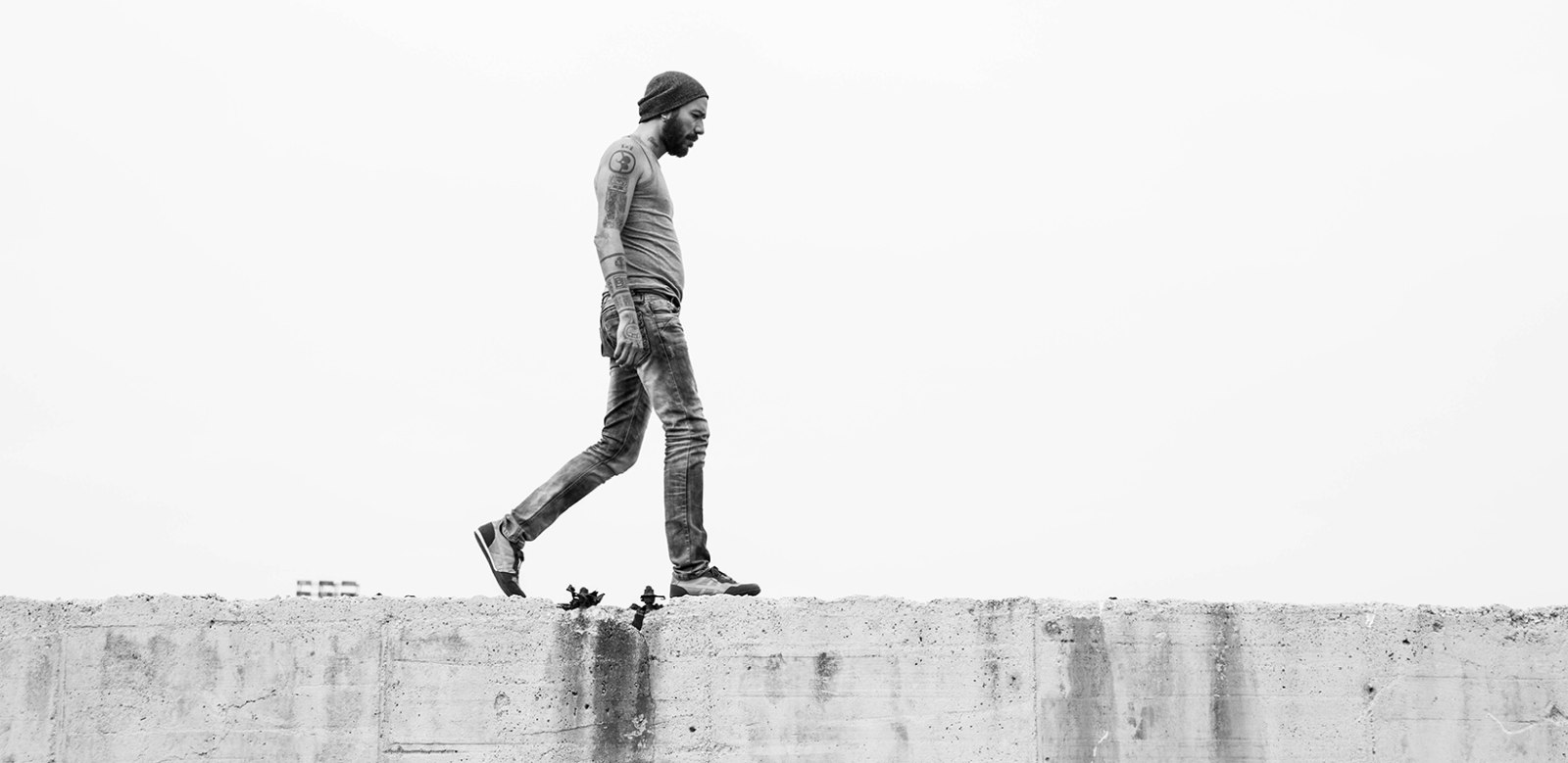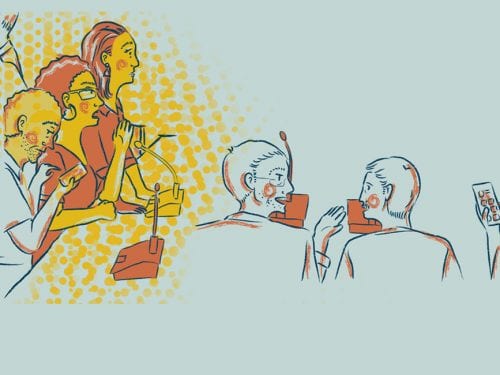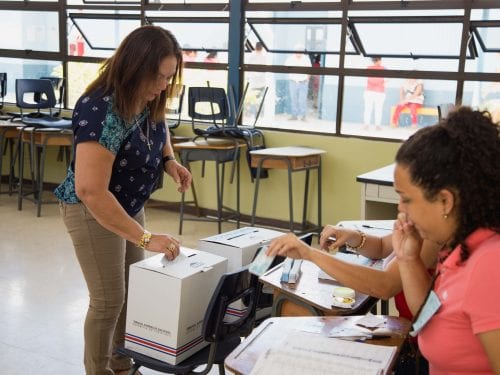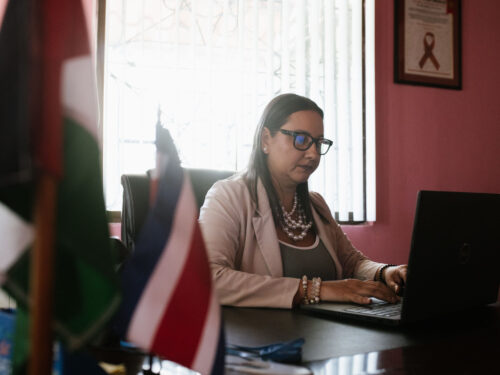
The years of Ramon Mejia’s life now amount to 44. He feels different now and expresses it, but he continues to go by his stage name, Perrozompopo (In Nicaragua, perrozompopo refers to a type of lizard that was used to protect against the yellow fever plague, a reference to his role in combating the plague of indifference). His ballads no longer criticize politics. His music now speaks openly about his lovers and knocks on different doors.
Mejia is recognized internationally as one of the most influential troubadours in the region, to the point of being nominated for the 2010 Latin Grammy for Best Alternative Music Album. In addition, he is a member of the Mejia Godoy family of musicians, among whom his brother, Luis Enrique, also stands out, well-known in the genre of salsa.
His muses also help him write poetry, and on June 10th, he will share his poems in Nicoya in the La Fulana Cosa restaurant, during a concert titled “Mis Cartas Sin Buzon” (My Letters Without a Mailbox).
The Voice of Guanacaste spoke with the artist, and he told us that he is working on releasing a fifth album of material in August: Dos Tiempos (Two Times).
Your concert in Nicoya includes poetry. What’s Different About This Recital?
All of the concerts will be the same. I will change some songs, but it is really the same repertoire and now with the plan to continue reading poetry. I think it is a way to present myself to people in a different way. To me, it’s like experiencing myself, how I put myself in this place of poetry. I don’t consider myself a poet. I simply write verses that I like and I express myself that way. Now I show that I have renounced the subject of politics as a writer and songwriter, because I have been discovering other things in life that are more important than criticism. I believe that, in order to make a change, the participation of not only artists but of any person should be from another platform and that is what I am starting to tell in my concerts.
In a way, La Fulana is the home of [singer and songwriter] Max Goldenberg and also saw the birth of [the musical group] Malpais. What does it mean to you to play there for the first time?
I know the importance of the site. I was once given one of Max’s CDs and I was hooked by the things I heard from him and at some point I thought about making versions of his work like a way to have a closer relationship with the Costa Rican culture, but then a thousand things end up happening and it went by the wayside. For me, it is important because it is the first time that I am going to be sharing at that site, in that place, with these figures and I know the transcendence that this place has in the culture of Costa Rican songs. In addition, the only place I have played in Guanacaste was in Liberia, years ago, and I was amazed that people knew me in Liberia.
You shared the stage with Malpais on several occasions. Do you have any special memory of Fidel Gamboa?
Well, I was not Fidel’s friend. We never spent much time together because I didn’t come very much. Malpais opened many doors for me. They were the first to introduce me. I remember that the first time Malpais invited me to sing was in the Sports Palace. Ivan [Gamboa] called me. So Malpais was, among others, the first group that took the initiative to invite me. Fidel and I saw each other. Unfortunately we never had the opportunity to share songs between us, to be alone and get to know each other, to get drunk together and grab our guitars and talk about what we think. We very rarely had that opportunity because we always saw each other on stage. We were only at his house once and that night we stayed up talking a long time, but there was not even music. What I liked most about Fidel is that he was a man who was really fearful of his own talents, being a great musician, being a great writer, being a great illusionist within his reality, so he took hold of all of these codes from his childhood and was capable of transforming them into beautiful songs, but he was a man who, like what happens to me, had some fear.
It seems that Costa Rica has been an important country for your career. Do you perceive it that way?
I love Costa Rica because I have met characters who really move things for me. I’ve gone in taxis, they ask me what I do and I tell them that I’m a musician, and there are taxi drivers that talk to me about ballads and they talk about a wide variety. In Nicaragua and in many countries, we have the perception that taxi drivers do not have that closeness to songwriting. It has happened to me in Costa Rica, not just with people in taxis, but with waiters and in bars. The public in Costa Rica is one of the few publics who have a close relationship with ballads. They know ballads from Spain, Cuba, Latin America, and that to me is almost something to be thankful for, because our work is very complicated. In Costa Rica, they ask me for things that I upload to the Internet with my phone and I like that, because you realize that people have a very close relationship.
Your last album was Mundo (World) in 2014. Are you working on something new?
I’m doing a new album that is going to be called Dos Tiempos (Two Times). Everything is already recorded, just my vocals are missing, but since I’ve been traveling a lot, I haven’t had time to go into the studio to finish it. They are tugging on my coattails for that. So I hope to release it in August.
Earlier you told me that your compositions renounced political criticism. What do you write about now? What inspires you?
What I am doing now is only writing love songs that have to do with experiences that I have had in recent years, lovers that I have had, crazy infatuations that I have had.
There are international artists who have refused to share their music on Spotify. You only have three songs on that application. Are you against this type of digital platform?
Look crazy, I think that what these platforms do is standardize the dynamics. It’s not bad. A few years ago, I stopped being against things. Now I simply either accept them or I don’t accept them, for whatever reasons. On Spotify… I am a very irresponsible person, or very unprofessional about my work. I am not up to date on how many followers I have; I don’t know, I don’t look at it. I’m not interested in seeing it. If I only have contact with 100 people, then I only have contact with 100. If my albums are not on Spotify or are not on YouTube, well, whatever. I keep living my life in peace. That this not being there represents losses of space in my career, that a big deception. We believe that the Internet is a portal to the whole world. Someone in Russia might see you, someone in Paris might see you. But who I do have contact with are the people from Jazz Cafe, La Fulana. I don’t need more.
I understand that you have now renounced political criticism, but you have written songs related to immigration, like Quiero Que Sepas (I Want You to Know). What do you think about the closure of the Nicaraguan borders to the Cuban migrants?
In political terms, I have no criticism. To me, what happens to me with these things is that we continue to believe that governments are this paternalistic muscle that will solve our problems. When we realize that only we as human beings, as men and women, are able of reconstructing our reality through solidarity, love, respect and understanding, that is when we are going to realize that we do not need any state or any law or agency to solve our problems. I think that just the people of Costa Rica and just the people of Nicaragua, without any intermediary, are capable of maintaining these populations in a state of companionship, solidarity, respect and love.
How would you invite someone from Guanacaste or a foreigner that knows nothing about your music or your career to your concert?
That is one thing that I can not answer for you (he laughs). Damn! Having expectations is the worst thing we can do. I would tell these people that if they like the writer’s song, regardless of whether they are unfamiliar with my work, they should go to find out, they should take time for themselves. That they should take the time to meet new people, to have new sensations, to have different feelings. I would tell them to leave their jobs, leave their responsibilities and go live life in a different way, for at least two horas. That we should stop being slaves and free ourselves for two hours through music.







Comments